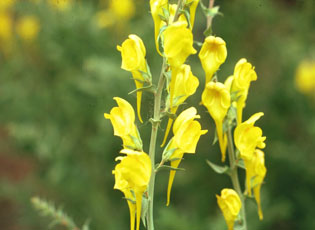
The plant is neither spotted nor four legged, but it does bark (ok, that’s a stretch).
Its scientific name is Linaria dalmatica, but to non-botanist types, this perennial herb is known as the Dalmatian toadflax or broadleaf toadflax. The Dalmatian Toadflax was introduced as an ornamental plant from the Mediterranean in the late 1800’s, and its flowers are similar to that of a snapdragon.
Many of us remember playing with snapdragons as kids, and making them “talk.” Good times.
A large plant can produce nearly 1/2 million seeds, and that may be one reason the short-lived plant is so prolific in arid rangelands, pastures, railways and waste areas. It’s also why the aggressive plant originally used to make yellow fabric dye and for medicinal purposes is regarded as a noxious weed in Colorado, South Dakota, Wyoming and other western states, if not an invasive species altogether.
So why is the plant named after a breed? It’s not. The Dalmatian Toadflax was named for the district of Dalmatia where it is native in Eurasia.
